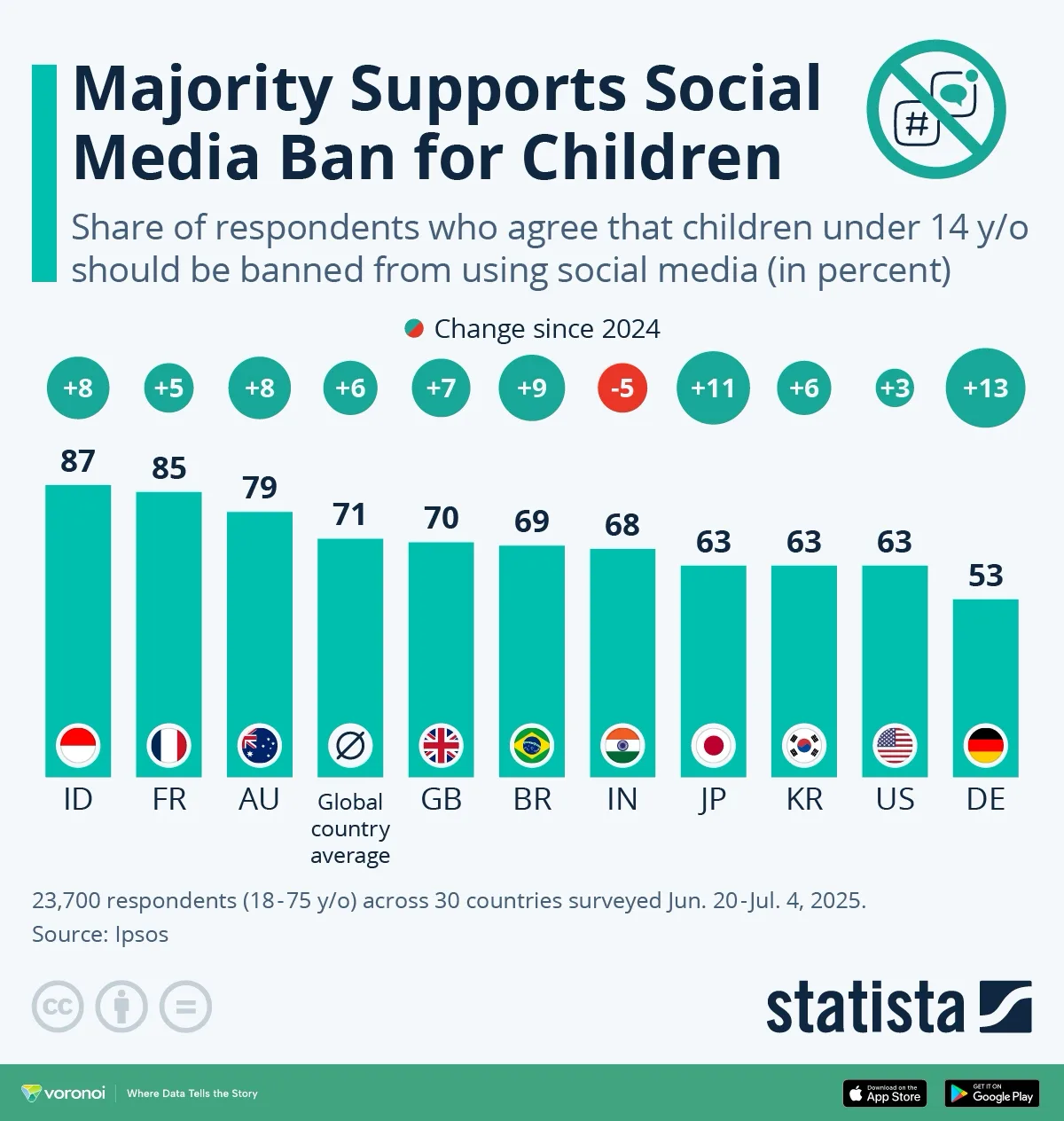![]()
See this visualization first on the Voronoi app.

Social Media Ban for Children Has Broad Public Support Globally
This was originally posted on our Voronoi app. Download the app for free on iOS or Android and discover incredible data-driven charts from a variety of trusted sources.
- 87% of Indonesians support banning social media for children under 14—the highest rate among countries surveyed.
- Australia, France, and the UK all show strong support (70%+), aligning with recent or proposed policy changes.
- Germany shows the lowest support at just 53%, despite a 13-point increase from 2024.
Public sentiment is shifting toward tighter controls on children’s access to social media platforms.
According to a recent Statista visualization based on Ipsos data, a majority of respondents across many countries believe that children under 14 should be banned from using social media.
In June–July 2025, Ipsos surveyed over 23,000 adults across 30 countries. The global average support for banning social media use by children under 14 now stands at 71%, with significant increases in support in most regions compared to the previous year. Here’s a breakdown of the data by country:
| Country | "Children under 14 y/o should be banned from social media" (%) | Change since 2024 |
|---|---|---|
| Indonesia | 87 | 8 |
| France | 85 | 5 |
| Australia | 79 | 8 |
| Global country average | 71 | 6 |
| Great Britain | 70 | 7 |
| Brazil | 69 | 9 |
| India | 68 | -5 |
| Japan | 63 | 11 |
| South Korea | 63 | 6 |
| United States | 63 | 3 |
| Germany | 53 | 13 |
Germany is the outlier with only 53% support, but it also saw the largest year-over-year jump in sentiment (+13%). Indonesia leads globally with 87% support, followed closely by France (85%) and Australia (79%).
Policy Changes Reflect Shifting Sentiment
This wave of public concern is already manifesting in real-world policy. Australia recently implemented a national ban preventing children under 16 from creating social media accounts, following rising mental health concerns. The country’s policy includes age verification tools and parental consent requirements.
Meanwhile, Denmark announced its intention to ban social media for children under 15. Prime Minister Mette Frederiksen warned that digital platforms were “stealing childhood,” echoing concerns raised by experts and parents worldwide.
Pros and Cons of a Social Media Ban
Supporters argue such bans protect mental health, reduce exposure to harmful content, and preserve in-person social development. This is especially relevant given mounting evidence that social media negatively affects girls’ sleep and well-being.
However, critics caution that bans can be difficult to enforce and may amount to overreach. A recent ITIF report argues that regulation should focus on education and platform accountability rather than outright restrictions.
Social Media Use Among Younger Generations
Despite these concerns, social media remains central to youth culture. Our past work visualizing Gen Z’s favorite social media platforms shows just how embedded these apps are in teenage life. For many young people, platforms like TikTok, Instagram, and Snapchat are key tools for communication, creativity, and identity.
Attempting to ban or restrict access isn’t always straightforward—and recent events in Nepal underscore this. In September 2025, the government temporarily banned TikTok, citing moral and social concerns.
The move was met with widespread backlash, especially among younger citizens. Protests quickly spread, resulting in street clashes and increased political tension, eventually forcing authorities to reverse course. The Nepal example serves as a reminder that while society at large may push for regulation, the younger generation may decide to push right back.
Learn More on the Voronoi App
How much do social media platforms make from you? Check out the answer in this infographic.